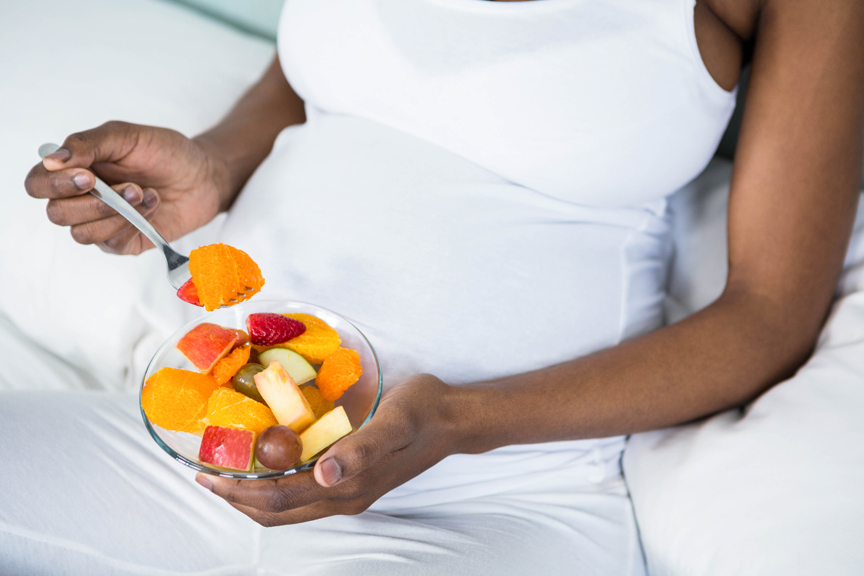- Health
- Parenting
What to eat (and not) during pregnancy

In this article you will find answers to questions like:
1. What foods should I eat to keep myself and my baby healthy?
2. What foods should I avoid?
3. What foods should I be careful of?
1. WHAT FOODS SHOULD I EAT TO KEEP MYSELF AND MY BABY HEALTHY?
Making good food choices is critical when you are pregnant. You can get help planning healthy meals at choosemyplate.gov, a website of the U.S. Department of Agriculture. You also can use the website to track what foods to eat from the five food groups and what you should be eating each trimester. Foods that are good for you:
Vegetable Group
- Carrots
- Sweet potatoes
- Pumpkin
- Spinach
- Cooked greens (such as kale, collards, turnip greens, and beet greens)
- Winter squash
- Tomatoes and tomato sauces
- Red sweet peppers
These vegetables all have both vitamin A and potassium. When choosing canned vegetables, look for "low sodium" or "no-salt-added" on the label.
Fruit Group
- Cantaloupe
- Honeydew melon
- Mangoes
- Prunes
- Bananas
- Apricots
- Oranges
- Red or pink grapefruit
- 100% prune juice or orange juice
These fruits all provide potassium, and many provide vitamin A. When choosing canned fruit, look for those canned in 100% fruit juice or water instead of syrup.
Dairy Group
- Fat-free or low-fat yogurt
- Fat-free milk (skim milk)
- Low-fat milk (1% milk)
- Calcium-fortified soy milk (soy beverage)
These all provide the calcium and potassium you need. Make sure your choices are fortified with vitamins A and D.
Grains Group
- Ready-to-eat cereals fortified with vitamins and minerals
- Cooked cereals fortified with vitamins and minerals
When buying ready-to-eat and cooked cereals, choose those made from whole grains.
Protein Group
- Beans and peas such as pinto beans, soybeans, white beans, lentils, kidney beans, and chickpeas
- Nuts and seeds such as sunflower seeds, almonds, hazelnuts, pine nuts, peanuts, and peanut butter
- Lean beef, lamb, chicken and pork
- Oysters, mussels, and crab
- Salmon, trout, herring, sardines and pollock
2. WHAT FOODS SHOULD I AVOID?
Pregnancy affects your immune system, and that means you and your unborn baby are more at risk of getting sick from bacteria, viruses and parasites. Did you know pregnant women are 13 times more likely to get the food-borne illness Listeriosis than other people? And while you may not get sick, the bacteria could infect your baby and cause future health problems.
Here are foods to avoid and foods you need to prepare carefully. Always have a food thermometer handy to ensure your food is fully cooked.
Foods you can’t eat because they may contain harmful bacteria or high levels of mercury:
- Unpasteurized milk and soft cheeses made with unpasteurized milk. Soft cheeses include queso blanco and feta. Always drink pasteurized milk or eat hard cheeses.
- Unpasteurized juice. Always drink pasteurized juice.
- Sushi or raw shellfish such as oysters. Always cook seafood to 145 degrees.
- Raw sprouts such as alfalfa and radishes. Always cook thoroughly.
- Store-made salads. Make your salads at home to ensure everything is properly cleaned and cooked.
- Sandwiches made with deli meats.
- Raw cookie dough or cake batter.
- Tuna, swordfish and shark. They may have high mercury levels. If you ever have questions about whether a particular type of cooked seafood is safe for pregnant women to eat, check with the U.S. Food and Drug Administration chart on what fish are safe to eat. It can be found at: https://www.fda.gov/Food/ResourcesForYou/Consumers/ucm393070.htm
3. WHAT FOODS SHOULD I BE CAREFUL OF?
- Hot dogs and deli-style meats need to be heated to 165 degrees before eating. Generally, it is best to avoid them.
- All meats need to be thoroughly cooked. Steak, veal, lamb and fish need to be 145 degrees. Pork and ground meats need to be 160 degrees. Poultry and any stuffing in the poultry need to be 165 degrees.
- Undercooked eggs. Cook eggs until yolks are firm and any egg dishes need to be heated to 160 degrees. Similarly, heat eggnog or the ingredients for homemade ice cream.
- Meat spreads or pates. They could be unpasteurized. Canned versions are considered safe.
- Smoked seafood. Versions that need to be refrigerated aren’t safe. Canned versions are safe.
U.S. Department of Agriculture
Foodsafety.gov
You May Also Like
-
- Health
- Parenting
- Things to do
Nutrition, exercise, less stress = healthy pregnancy, foundation
Did you know a mother's stress can have long-lasting effects on her unborn child? And that dental health is just as important as physical and mental health? Read on for more (perha …
Read More
Related resources
-
- Health
- Other
- Parenting
Healthy Mothers, Healthy Babies Coalition of Palm Beach County
A safety net of local services and support for pregnant women and families with infants, focusing on racial disparities in birth outcomes
561-623-2800 Website -
- Health
- Safety
U.S. Department of Health & Human Services
Foodsafety.gov — U.S. government website dedicated to information on food safety, food recalls and more
Website -
- Health
- Parenting
U.S. Department of Agriculture
WIC Works Resource System — advice and information for pregnant women on health and wellness
Website
